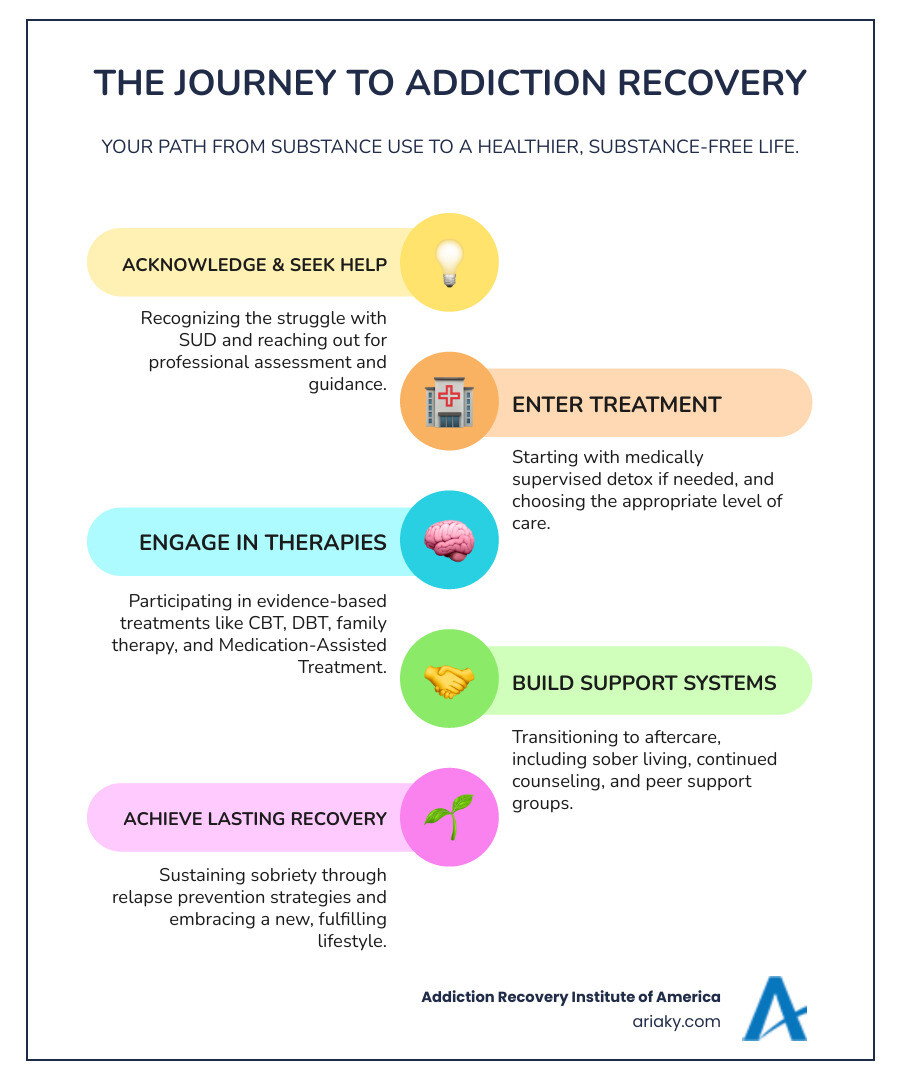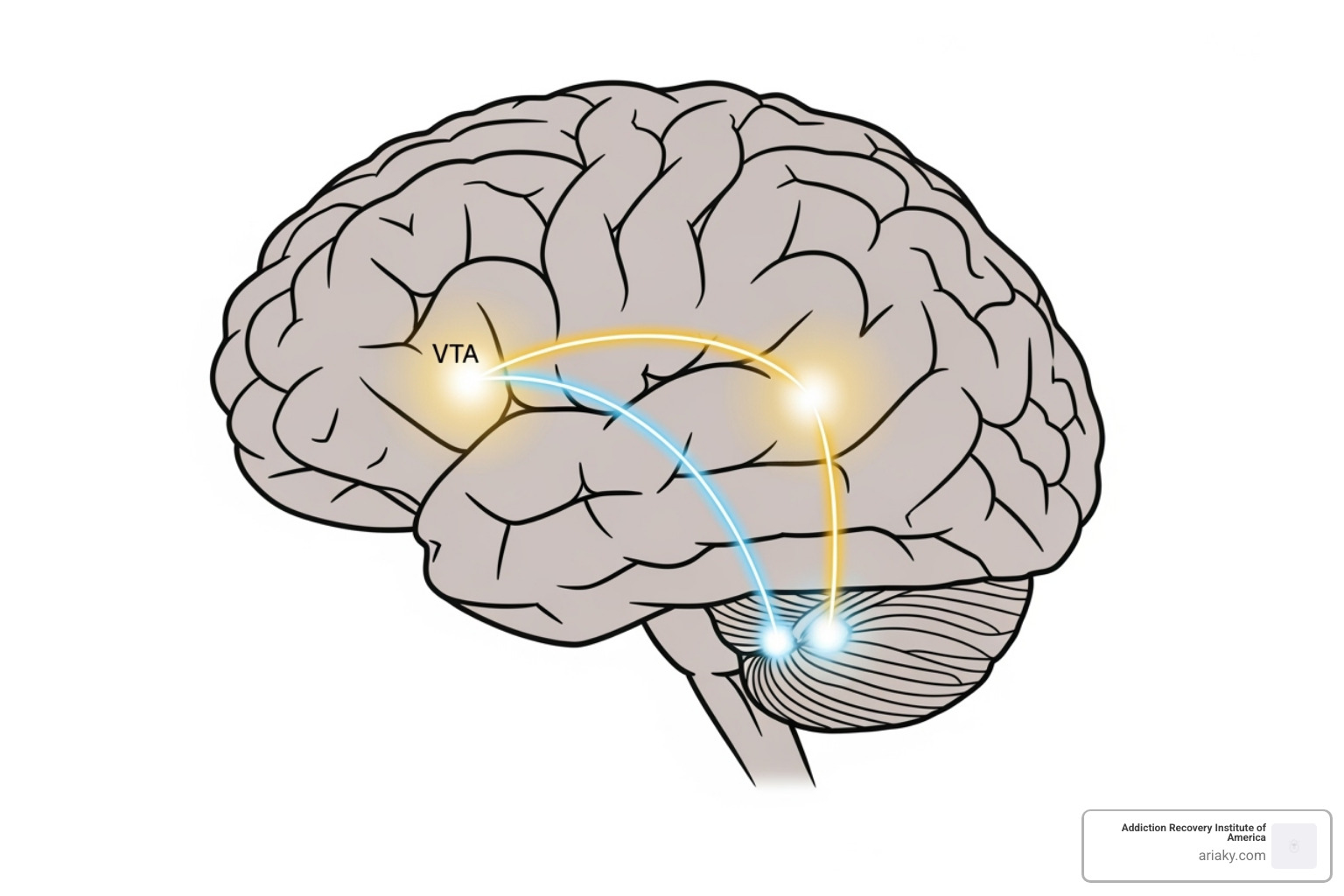Why Understanding Your Treatment Options Matters
Choosing the right addiction treatment options can feel overwhelming, but understanding what’s available is the first step toward recovery. The good news is that help has never been more accessible or diverse.
Key addiction treatment options include:
- Detoxification – Medically supervised withdrawal management
- Inpatient/Residential Programs – 24/7 care in a structured environment
- Outpatient Programs – Flexible treatment while living at home (PHP, IOP, standard outpatient)
- Medication-Assisted Treatment (MAT) – FDA-approved medications to reduce cravings
- Behavioral Therapies – CBT, DBT, family therapy, and motivational approaches
- Support Groups – 12-step programs (AA/NA) and alternatives like SMART Recovery
- Aftercare Services – Sober living, continued counseling, and recovery support
The truth is simple: addiction is a treatable disease, not a character flaw. In 2022, over one in six Americans aged 12 or older had a substance use disorder, but the vast majority didn’t receive treatment.
Recovery is possible. Effective treatment isn’t a one-size-fits-all cure; it’s a personalized plan for managing a chronic condition, much like diabetes. The journey is unique for everyone, addressing specific needs and circumstances. Understanding these options is the key to building a life free from addiction.

Understanding Addiction: The First Step to Recovery
Before exploring your addiction treatment options, it’s crucial to understand what addiction is. Clinically known as Substance Use Disorder (SUD), addiction is a treatable chronic brain disease, not a moral failing or character flaw. Substances can change the brain’s structure and function, making it incredibly difficult to stop using despite negative consequences. This disease can affect anyone, regardless of background, and understanding this helps reduce the stigma that prevents many from seeking help.
For a deeper dive into different substances, explore our resources on Substance Abuse Topics.

Signs and Symptoms of Addiction
How do you know when substance use has crossed into addiction? Professionals often use the “4 Cs” as indicators:
- Craving: Intense urges for the substance.
- Loss of Control: Using more than intended or being unable to stop.
- Compulsion: An overwhelming drive to use.
- Consequences: Continuing use despite clear negative impacts on life, health, or relationships.
Other signs can include physical changes (neglected hygiene, weight shifts, tremors), behavioral red flags (secrecy, loss of interest in hobbies, legal issues), and psychological symptoms (mood swings, anxiety, paranoia). If you’re concerned about alcohol withdrawal, our page on Alcohol WD details what to watch for.
Causes, Risk Factors, and Diagnosis
Addiction has no single cause but results from a combination of factors. Genetics can account for about half of a person’s risk. Environmental factors like early exposure, peer pressure, or lack of supervision also play a significant role. Co-occurring mental health disorders like depression or anxiety are common, as people may use substances to self-medicate. Trauma is another major risk factor, as substances can become a way to numb painful memories.
An accurate diagnosis requires a professional assessment from a qualified mental health or addiction counselor, who will use criteria from the DSM-5. This evaluation looks at the overall impact of substance use on your life. Understanding these factors isn’t about blame; it’s about creating an effective treatment plan that addresses your unique situation. Learn more about this connection on our Mental Health Disorder resources.
The Continuum of Care: Levels of Addiction Treatment
There is no single “right” way to recover from addiction. Effective treatment centers use a continuum of care, a flexible approach that matches the level of support to your needs. You might start at one level and step up or down as your recovery journey progresses. The key is finding the right fit for your substance use patterns, mental health, and home environment. At ARIA Kentucky, we meet you where you are. Learn more about our approach on our Continuum of Care page.

Medically Supervised Detoxification
For many, recovery begins with detoxification, the process of safely clearing substances from the body while managing withdrawal. Stopping suddenly can be dangerous, especially with alcohol or benzodiazepines. In a medically supervised setting, professionals monitor you and can provide medication to ease symptoms and ensure safety. Our Kentucky Detox Programs and Heroin Detox page offer more information. Crucially, detox is not a cure for addiction. It’s a vital first step that stabilizes you physically, preparing you for the psychological work of recovery.
Inpatient and Residential Programs
When you need to focus completely on recovery away from daily triggers, inpatient and residential programs offer the most intensive level of care. Inpatient treatment is hospital-based for those with acute medical or mental health needs. Residential treatment involves living at a facility for 28 days or more, immersed in a structured, substance-free environment with 24/7 therapeutic support. These settings provide a safe space to address the root causes of addiction. Explore our Residential Care Kentucky, Mens Drug Rehab, and Rehab for Women programs.
Outpatient Program Levels
Outpatient programs offer professional treatment while you live at home, providing flexibility for work, school, or family duties. They are ideal for those with a stable home environment or as a step-down from residential care.
- Partial Hospitalization Programs (PHP): The most intensive outpatient option, with 20+ hours of treatment per week. It offers a level of care similar to residential programs but allows you to return home each evening. Learn about our PHP Treatment Kentucky.
- Intensive Outpatient Programs (IOP): A step down in intensity, requiring 10-20 hours of therapy per week. IOP allows you to balance treatment with daily responsibilities. See our Best Intensive Outpatient Program Kentucky.
- Standard Outpatient: The most flexible option, with fewer than nine hours of treatment per week. It’s ideal for long-term maintenance and relapse prevention.
TABLE: Comparing Levels of Care: Inpatient vs. PHP vs. IOP vs. Outpatient
| Level of Care | Intensity (Hours/Week) | Living Situation | Level of Support | Ideal Candidate |
|---|---|---|---|---|
| Inpatient/Residential | 24/7 | Live at facility | Highest; 24/7 medical & therapeutic supervision | Severe SUDs, co-occurring mental/medical conditions, unstable home environment, history of relapse, need for removal from triggers |
| Partial Hospitalization (PHP) | 20+ hours | Live at home (or sober living) | High; daily structured therapy, medical oversight | Moderate to severe SUDs, medically stable, strong home support, need for high structure without overnight stay, stepping down from inpatient |
| Intensive Outpatient (IOP) | 10-20 hours | Live at home (or sober living) | Medium; regular structured therapy, some medical | Mild to moderate SUDs, strong home support, ability to manage triggers, stepping down from PHP, need to maintain work/school/family responsibilities |
| Standard Outpatient | Up to 9 hours | Live at home | Low; weekly therapy, minimal medical oversight | Mild SUDs, strong coping skills, stable home environment, stepping down from IOP, long-term maintenance and relapse prevention |
Exploring Your Core Addiction Treatment Options
Once you’ve determined the right level of care, what does treatment actually involve? Effective addiction treatment options are built on evidence-based practices and individualized to fit your unique needs. A strong relationship with your treatment team, known as the “therapeutic alliance,” is a key predictor of success. At ARIA Kentucky, we focus on building these trusted relationships. Learn more on our Addiction Therapy Kentucky page.
For a deeper look at the science, the Principles of Drug Addiction Treatment: A Research-Based Guide is an excellent resource.
Behavioral Therapies: The Cornerstone of Recovery
Behavioral therapies are fundamental to recovery, helping you understand the ‘why’ behind your substance use and teaching you new coping skills.
- Cognitive Behavioral Therapy (CBT): Helps you identify and change negative thought patterns and behaviors related to substance use. Our Cognitive Behavioral Therapy Program focuses on building these essential skills.
- Dialectical Behavior Therapy (DBT): Teaches skills in mindfulness, distress tolerance, emotion regulation, and interpersonal effectiveness. It’s especially helpful for those with intense emotions or co-occurring mental health conditions.
- Motivational Improvement Therapy (MET): Uses motivational interviewing to help you find your own internal motivation for change, resolving any ambivalence about recovery.
- Family Therapy: Involves loved ones in the healing process to improve communication, rebuild trust, and establish healthy boundaries. Healing together creates stronger, lasting recovery. Learn about our Family Therapy Program KY.
Medication-Assisted Treatment (MAT) for specific addiction treatment options
Medication-Assisted Treatment (MAT) combines FDA-approved medications with counseling to treat substance use disorders. It is not “replacing one drug with another.” These medications normalize brain chemistry, reduce cravings, and ease withdrawal, making it easier to engage in therapy. Research confirms MAT is highly effective for opioid and alcohol addiction.
- For Opioid Addiction: Medications like Buprenorphine (Suboxone) and Naltrexone (Vivitrol) reduce cravings and withdrawal symptoms, block the effects of opioids, and significantly lower the risk of overdose. MAT is considered a first-line treatment for opioid use disorder.
- For Alcohol Addiction: Medications like Naltrexone, Acamprosate, and Disulfiram can help reduce cravings, prevent relapse, and discourage drinking.
Currently, there are no FDA-approved medications for stimulant or cannabis addiction, for which treatment relies on behavioral therapies. Our Medication Assisted Treatment programs integrate these tools into comprehensive care. For more details, visit SAMHSA’s page on Medication-Assisted Treatment (MAT) | SAMHSA.
Holistic and Alternative Addiction Treatment Options
Many programs incorporate holistic approaches to treat the whole person—mind, body, and spirit. These complementary therapies can include:
- Yoga and mindfulness to reduce stress and reconnect with your body.
- Art and music therapy for creative emotional expression.
- Equine therapy to build trust, responsibility, and self-esteem.
- Biofeedback to learn control over bodily functions like heart rate to manage stress.
These methods should be used alongside, not as a replacement for, evidence-based treatments like therapy and MAT. Explore our recovery-focused Activites for more information.
Life After Formal Treatment: Building Lifelong Recovery
Finishing a formal treatment program is a major achievement, but recovery is a lifelong journey. Addiction is a chronic condition that requires ongoing management. Relapse can be part of the process; it’s not a failure, but a sign that your recovery plan may need adjustment. The goal is to build a fulfilling life beyond just abstinence. This requires using the tools you’ve learned and building strong support systems. Our page on Addiction Recovery Challenges offers valuable insights for this journey.

Support Groups and Peer Communities
Connecting with others who understand your experience is a powerful tool for long-term recovery. Peer support groups reduce the shame and isolation of addiction.
- 12-Step Programs: Alcoholics Anonymous (AA) and Narcotics Anonymous (NA) are well-known programs based on a spiritual framework of mutual support.
- Non-12-Step Alternatives: Groups like Self-Management and Recovery Training (SMART) offer a science-based approach using cognitive-behavioral techniques to build self-reliance.
- Family Support: Groups like Al-Anon and Nar-Anon provide crucial support and education for family and friends affected by a loved one’s addiction.
Aftercare and Transitional Living
Transitioning from a structured treatment environment back to daily life can be challenging. Aftercare services provide a vital bridge.
- Sober Living Homes: These are substance-free residences that offer structure and peer support as you reintegrate into society.
- Continued Counseling: Ongoing individual or group therapy helps you steer new challenges and reinforce coping skills.
- Alumni Programs: Many treatment centers offer alumni networks for lasting community and support.
- Recovery Coaching: A recovery coach provides one-on-one mentorship to help you set goals and stay motivated.
- Specialized Support: For younger individuals, recovery high schools and collegiate recovery programs offer environments that support both education and sobriety.
Finding local aftercare is crucial. Our Recovery Center Near Me resources can help you locate these essential services. Asking for help after treatment is a sign of strength, not weakness.
How to Find and Pay for Addiction Treatment
Finding the right addiction treatment options shouldn’t add more stress to a difficult time. When researching facilities, look for programs that offer individualized care plans, use evidence-based practices, and are properly licensed and accredited. A quality program will also provide comprehensive services, including medical care and mental health treatment for co-occurring disorders. The Behavioral Health Treatment Services (SAMHSA) locator is a helpful national directory to start your search. You can also contact us at ARIA Kentucky to discuss your specific needs.
Is Treatment Covered by Insurance?
The good news is that most insurance plans cover addiction treatment. The Affordable Care Act (ACA) mandates that most health plans cover mental health and substance use disorder services as essential benefits. This means treatment for addiction is typically covered like any other chronic disease.
However, every plan is different. Your deductibles, co-pays, and specific covered services will vary. The best first step is to contact your insurance provider directly to understand your benefits. Our team at ARIA Kentucky is here to help you steer the insurance verification process. We work with many providers, including Aetna Insurance and Blue Cross Blue Shield, and can help clarify your potential costs.
If you don’t have insurance, don’t let that stop you from seeking help. Many facilities offer private pay options, financing, or can direct you to state-funded programs. Financial concerns are valid, but options are almost always available. For more details, visit our page on Paying for Treatment.
Conclusion: Your Path to a Healthier Future Starts Today
If you’ve read this far, you’ve taken a courageous first step: educating yourself on the path to recovery. We’ve covered the full range of addiction treatment options, from medically supervised detox and immersive residential programs to flexible outpatient services, evidence-based therapies, and medication-assisted treatment. We’ve also highlighted the importance of aftercare and peer support for maintaining long-term sobriety.
Here’s the most important takeaway: recovery is possible for you or the person you love. Addiction is a treatable disease, not a life sentence. The hardest part is often making that first call, but you don’t have to do it alone.
At ARIA Kentucky, we are an accredited, AODE-certified addiction rehab center providing a full continuum of care custom to your unique needs. We see you as a whole person, not a diagnosis, and are committed to walking alongside you as you build a life of lasting sobriety.
Your path to a healthier future starts today. Explore our Kentucky Drug & Alcohol Rehab Programs to learn how we can support your journey. You deserve healing and hope, and we’re here to help you find both.

